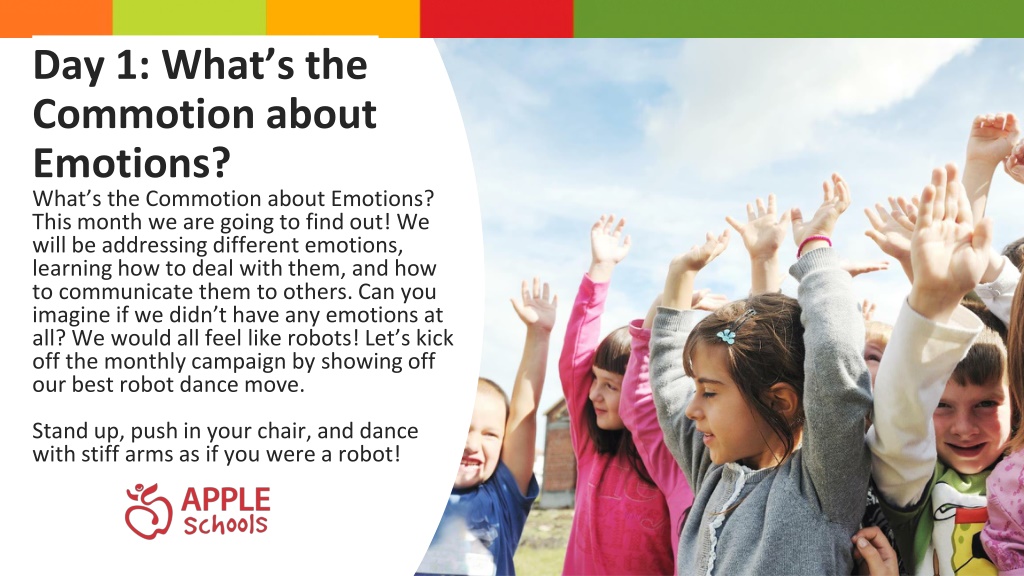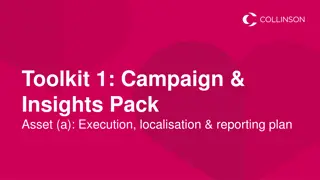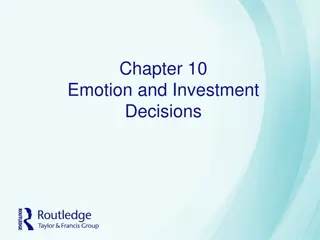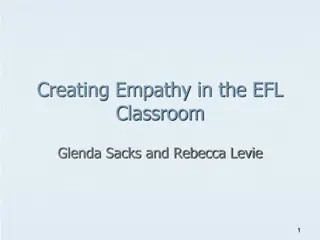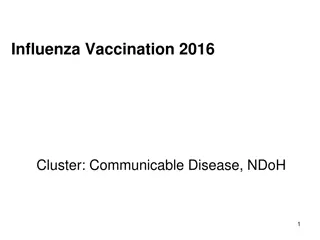Exploring Emotions: A Monthly Campaign on Understanding and Managing Emotions
Throughout this month-long campaign, we delve into different emotions, learning how to cope with them and effectively communicate them to others. From robot dances to mindfulness practices, each day offers unique insights and strategies for emotional intelligence.
Download Presentation

Please find below an Image/Link to download the presentation.
The content on the website is provided AS IS for your information and personal use only. It may not be sold, licensed, or shared on other websites without obtaining consent from the author. Download presentation by click this link. If you encounter any issues during the download, it is possible that the publisher has removed the file from their server.
E N D
Presentation Transcript
Day 1: Whats the Commotion about Emotions? What s the Commotion about Emotions? This month we are going to find out! We will be addressing different emotions, learning how to deal with them, and how to communicate them to others. Can you imagine if we didn t have any emotions at all? We would all feel like robots! Let s kick off the monthly campaign by showing off our best robot dance move. Stand up, push in your chair, and dance with stiff arms as if you were a robot!
Day 2: Whats the Commotion about Emotions? An emotion is a strong feeling, thought or attitude. Some of the emotions that we are going to be learning about this month are nervousness, happiness, sadness, anger, grumpiness, and excitement. What is another emotion that you can think of? Tell insert School Health Facilitator s/ Champion s name when you see them next!
Day 3: Whats the Commotion about Emotions? When you think of someone who is really smart, you probably think they re good at different school subjects. But have you heard of emotional intelligence? The skills we are learning in understanding and managing our emotions this month will make us more intelligent! Kind of like studying for a test does.
Day 4: Whats the Commotion about Emotions? Do you know what it feels like to be nervous? Our hearts beat faster, our minds feel jumbled and we might feel worried or uncomfortable about something. When we have to speak in front of people or have worries about getting all of our homework done in time, we might feel nervous. An important way to begin to manage this feeling, is learning how to explain it to your parent/guardian or adult you trust. Asking for help is key!
Day 5: Whats the Commotion about Emotions? Yesterday we learned about nervousness. Other than telling adults we trust, another way to manage this feeling is by practicing mindfulness. Everyone sit comfortably in your chair with both feet touching the ground. Let s try this for 10 seconds. All you need to do is close your eyes, slow down your breath, and try to focus only on the present moment. That was just a quick taste of how to practice mindfulness to feel more calm.
Day 6: Whats the Commotion about Emotions? One strategy to help you feel less nervous is to have a good laugh. Here is a joke to take your mind off of any nerves: Q: What do you call a sleepy dinosaur? A: A dino-snore!
Day 7: Whats the Commotion about Emotions? Happiness is the feeling of pleasure or joy. This feeling might make us want to giggle or sing and dance to keep our mood high. Let s keep that positive energy up by showing off our best dance moves. Everyone stand up, push in your chair, and show your best move!
Day 8: Whats the Commotion about Emotions? Yesterday we did a dance move to increase our feelings of happiness. Did you know dancing, or doing any form of exercise, releases endorphins called serotonin and dopamine in our brains? These endorphins boost our mood and can help us regulate our emotions. Just another great reason to get the recommended 60 minutes of physical activity per day!
Day 9: Whats the Commotion about Emotions? Yesterday we talked about two different endorphins that are released in our brains while we exercise. If you can remember either of them, yell out your answers! The answers were serotonin and dopamine! Pat yourself on the back if you got it right.
Day 10: Whats the Commotion about Emotions? Sadness is a feeling of sorrow or unhappiness. You might feel sad if your friends don t include you in a game. When you feel sad, what does it feel like in your body? Maybe your heart feels heavy or your stomach hurts. Let s shake off some of that sad energy by doing 10 jumping jacks.
Day 11: Whats the Commotion about Emotions? A great strategy to deal with sadness is writing or drawing about how we feel. Describing your feelings on paper using words or pictures can help you to understand them better and make them easier to talk about. Think about one person that makes you feel better when you feel sad.
Day 12: Whats the Commotion about Emotions? It definitely doesn t feel good to be sad, but being sad is not always a bad thing. If we feel hurt or disappointed by a situation, it is completely normal to be sad. We don t always have to cheer up right away sometimes it feels good to understand that we feel sad and to talk to someone you trust about it.
Day 13: Whats the Commotion about Emotions? Empathy is when we see someone feeling sad, and start to feel sad too on their behalf. Some people describe it as putting yourself in the other person s shoes. If you saw someone you love crying, you might feel sad for them and want to cry too. Empathy is a skill that gets better when we understanding our own emotions, because this means we can understand those emotions in other people.
Day 14: Whats the Commotion about Emotions? Do you remember the word that we learned yesterday that means putting yourself in someone else s shoes? If you do, tell your teacher what it is and give them an example of a time when you have felt that way.
Day 15: Whats the Commotion about Emotions? What happens in your body when you feel angry? Maybe it means stomping your feet, closing your fists, and tensing the muscles in your face and shoulders. Take a moment to make your face look as angry as you can and look around the class!
Day 16: Whats the Commotion about Emotions? When someone hurts our feelings, we might want to respond by hurting them back. Instead of reacting in this way, we can practice choosing our actions wisely. A healthy way to deal with anger could be by pausing to take deep breaths so that you can explain calmly why you feel hurt. Try taking 3 deep breaths next time you feel angry with someone.
Day 17: Whats the Commotion about Emotions? Have you ever thought about how different feelings could be represented by different colours? For example, maybe happiness could be a yellow feeling, or anger could be a red feeling. Think about how you are feeling right now tell the person next to you what that colour could be.
Day 18: Whats the Commotion about Emotions? Excitement is an emotion that is full of enthusiasm, interest, and energy. This is a great feeling to have, but it can be hard to focus on school or listen to our teacher when we have a lot of excitement. A strategy to deal with all of this energy could be to take an activity break. Let s release some of that energy by standing up, pushing in our chairs, and doing 10 shoulder shrugs.
Day 19: Whats the Commotion about Emotions? What can we do when we feel grumpy? To deal with this feeling, reading a funny book or having a nap could improve your mood. Think about another word for grumpy and tell your teacher what it is.
Day 20: Whats the Commotion about Emotions? When we feel grumpy, our mood might rub off on the people we are spending time with. Next time you feel grumpy, try enjoying some alone time. Taking time for yourself can help you to cheer up and recharge.
Day 21: Whats the Commotion about Emotions? Have you ever found it difficult to explain to someone how you are feeling? It is important to be able to communicate our emotions so that we feel understood and allow others to help us through tough feelings. Knowing different words for certain feelings can make us better at talking about them. Can you think of 2 other words for sad?
Day 22: Whats the Commotion about Emotions? Yesterday we learned about the importance of being able to talk about our feelings. The other important side of being a good communicator is learning to listen. Seek first to understand and then to be understood the next time you have a conversation with someone. You can do this by keeping your eyes on the person you re speaking with, asking questions, and trying not to interrupt them.
Day 23: Whats the Commotion about Emotions? This month we talked about nervousness, happiness, sadness, anger, grumpiness, and excitement. We learned what these emotions mean, how they feel, and how we can begin to address them. Understanding our different feelings and how to communicate them gives us important skills to improve our mental health. To congratulate yourselves on finishing this monthly campaign, give a high fives to 3 people around you!
